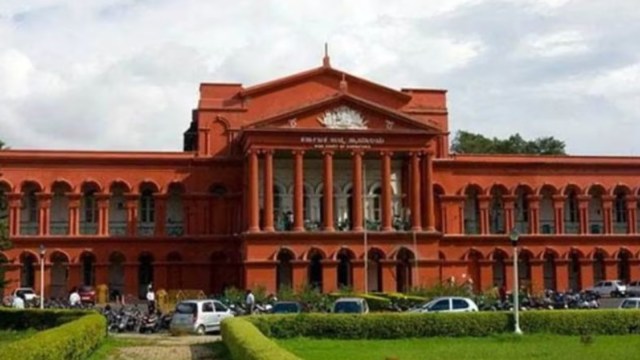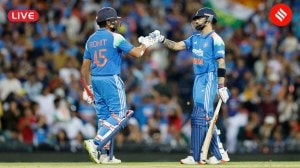Karnataka HC to pronounce orders Tuesday in CM Siddaramaiah’s plea against Governor’s sanction for probe in MUDA land grant to wife
The judgment in the case is expected to clarify whether the protection accorded under Section 17A of the Prevention of Corruption Act in 2018 to public servants from facing frivolous cases filed by private individuals requires competent authorities to provide reasoned orders for granting or denying sanction
 In the case of the Karnataka CM Siddaramaiah, the Governor’s prior sanction has been obtained by three private complainants but the sanction order of the Governor and its ingredients have been called into question. (File Photo)
In the case of the Karnataka CM Siddaramaiah, the Governor’s prior sanction has been obtained by three private complainants but the sanction order of the Governor and its ingredients have been called into question. (File Photo)The Karnataka High Court will Tuesday pronounce its judgment in a petition filed by Chief Minister Siddaramaiah against an approval granted by the Governor to three persons to file cases of corruption against him over the allotment of 14 housing sites to his wife by the Mysore Urban Development Authority (MUDA).
The high court reserved its judgment on September 12 after marathon arguments in the writ petition filed by the Karnataka CM on August 19 against the decision of Governor Thawarchand Gehlot.
The verdict on Tuesday is scheduled to be pronounced by Justice M Nagaprasanna who has made landmark judgments in the past on the applicability of the Prevention of Corruption Act, 1988, after it was amended in 2018 with the introduction of Section 17 A to provide additional protection to public servants from being investigated on a frivolous basis.
In July 2023, Justice Nagaprasanna ruled in the ‘Dr V Ashok versus Karnataka Lokayukta case’ that a prior sanction from a competent authority is mandatory against a public servant under the amended Section 17 A of the Prevention of Corruption Act for the filing of a case of corruption by the police on the basis of a private complaint filed in a court.
In the case of the Karnataka CM Siddaramaiah, the Governor’s prior sanction has been obtained by three private complainants but the sanction order of the Governor and its ingredients have been called into question.
In the arguments that concluded on September 12, it was argued on behalf of Siddaramaiah that the Governor had failed to rationalise his August 16 order to grant approval to private persons to file cases against the CM despite the state cabinet advising the Governor against granting the sanction.
Once the Governor had drawn the conclusion that there was a case to be investigated, he should have rationalised in his final order the reasons for the conclusion, the senior counsel for the Karnataka CM argued while asking the Court to send the sanction order back to the Governor.
The Governor “cannot assume the advice of the cabinet of ministers is biased and assume discretionary powers” and “must explain orders that the cabinet decision suffers from manifest irrationality”, the senior counsel argued.
Siddaramaiah’s counsel also argued that the Karnataka Governor showed unusual urgency in granting the sanction for filing cases against the Karnataka CM but at the same time took nearly three years to reject a similar sanction sought under Section 17A of the Prevention of Corruption Act for conducting investigations against former BJP minister Shashikala Jolle.
Karnataka Advocate General Shashikiran Shetty also argued that the sanction of the Governor was sought prematurely by the complainants and that a police officer is mandated by Section 17A to be the authority to seek sanction after a preliminary probe.
During the arguments, Justice Nagaprasanna reiterated his position that the requirements under Section 17A do not mandate that only a police officer can seek approval for initiating an inquiry against a public servant.
Ravi Varma Kumar, senior advocate and former advocate general, who also appeared on behalf of Siddaramaiah, argued that the Governor’s sanction order was flawed since it did not take into consideration documents that showed that the land allotment to the CM’s wife was done as compensation for 3.16 acre of land taken over illegally by Mysore authorities.
He also argued that corruption cannot be implied in the case spanning over 23 years since no decisions were taken by Siddaramaiah on the land when he was in power and that the allotment of 14 housing sites as compensation was done during the tenure of the BJP.
The judgment in the case is expected to clarify whether the protection accorded under Section 17A in 2018 to public servants from facing frivolous cases filed by private individuals requires competent authorities to provide reasoned orders for granting or denying sanction.
Some of the advocates for the three private complainants against the Karnataka CM have argued that the Governor’s sanction under Section 17A of the Prevention of Corruption Act is legally valid since it allows the start of a probe into whether Siddaramaiah can be linked to the land allotments made to his wife during the BJP’s tenure in 2021.







